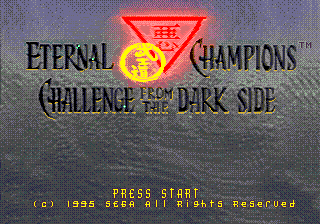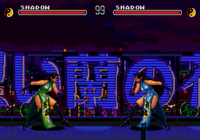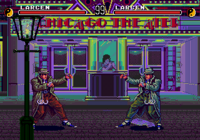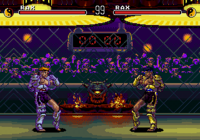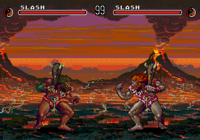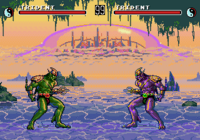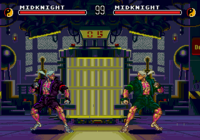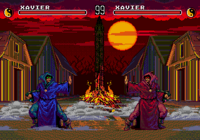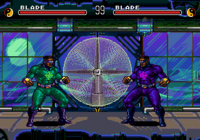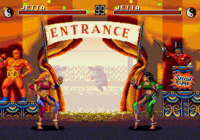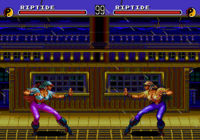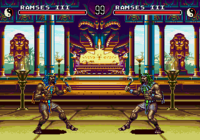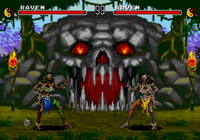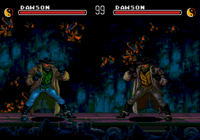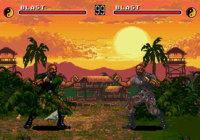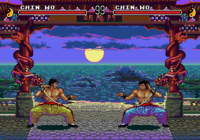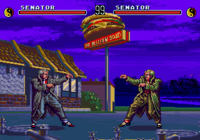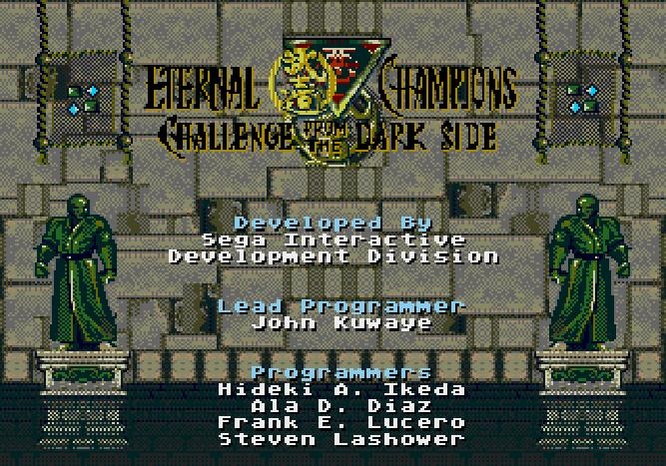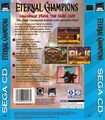Eternal Champions: Challenge From the Dark Side
From Sega Retro
- For the Sega Mega Drive game, see Eternal Champions.
| Eternal Champions: Challenge From the Dark Side | ||||||||||||||||||||||||||||||
|---|---|---|---|---|---|---|---|---|---|---|---|---|---|---|---|---|---|---|---|---|---|---|---|---|---|---|---|---|---|---|
| System(s): Sega Mega-CD | ||||||||||||||||||||||||||||||
| Publisher: Sega of America (US), Sega Europe (EU), TecToy (BR) | ||||||||||||||||||||||||||||||
| Developer: Sega Interactive Development Division[1] | ||||||||||||||||||||||||||||||
| Supporting companies: DMP Studios (voice actors), Omega Group, Kronos Digital Entertainment (cutscenes) | ||||||||||||||||||||||||||||||
| Distributor: Ecofilmes (PT) | ||||||||||||||||||||||||||||||
| Peripherals supported: Six Button Control Pad | ||||||||||||||||||||||||||||||
| Genre: Action | ||||||||||||||||||||||||||||||
| Number of players: 1-2 | ||||||||||||||||||||||||||||||
|
Eternal Champions: Challenge From the Dark Side is a Sega Mega-CD fighting game released in 1995. It is an enhanced and expanded version of the Sega Mega Drive title, Eternal Champions.
Contents
Story
The Eternal Champion is an immortal, cosmic being who feels that the balance of the universe and time has been disturbed by the deaths of key individuals destined to change the world for the greater good. To restore the balance, he holds a great contest in which the winner is granted the gift of new life, allowing them to fulfill their rightful destiny.
It is revealed that the Eternal Champion has a sinister counterpart: the Dark Champion. The Dark Champion appears and declares that he also will enter the contest and that he has hidden four more warriors, preventing the contest from truly being fulfilled. The contestants must not only achieve the aims of the Eternal Champion but also face the Dark Champion to win their lives back.
Gameplay
The game is a 2D one-on-one fighting game like its predecessor. Players have a selection of immediately playable characters, and there are many more unlockable ones. Players compete in best-of-three-round matches with time limits. When certain requirements are met, characters can perform special finishing moves (some stage-specific). In addition to an enhanced presentation with a CD audio soundtrack and numerous full-motion video sequences, the game adds new characters and stages, gives new special moves to existing characters, introduces a combo system, and adds three new kinds of gory finishing moves (while making the original Overkills gorier to match). Most special moves use less of the Inner Strength meter than in the previous game, and there is a new type of special attack that does not deplete the special attack meter at all.
Characters move with ![]() and
and ![]() , crouch with
, crouch with ![]() , and jump with
, and jump with ![]() . There are three punches and three kicks, increasing in power but decreasing in quickness. The punches are
. There are three punches and three kicks, increasing in power but decreasing in quickness. The punches are ![]() (straight),
(straight), ![]() (lunge), and
(lunge), and ![]() (swing). The kicks are
(swing). The kicks are ![]() (snap),
(snap), ![]() (thrust), and
(thrust), and ![]() (wheel). When playing with a standard three-button control pad, START toggles between punches and kicks and START +
(wheel). When playing with a standard three-button control pad, START toggles between punches and kicks and START +![]() +
+![]() +
+![]() pauses the game. Attacks can be blocked by pressing away (for high attacks) or down and away (for low attacks). Grapples are executed by standing close to an opponent and pressing
pauses the game. Attacks can be blocked by pressing away (for high attacks) or down and away (for low attacks). Grapples are executed by standing close to an opponent and pressing ![]() or
or ![]() and using either the medium or the strong punch button. These attacks cannot be blocked or escaped. If a character is hit several times in a row they become "dizzy" and their opponent can land a free attack.
and using either the medium or the strong punch button. These attacks cannot be blocked or escaped. If a character is hit several times in a row they become "dizzy" and their opponent can land a free attack.
Each character has their own unique special attacks that are performed with special button combinations. Many special moves are performed by "charging" in a direction, then pressing the opposite direction coupled with an attack button, but the game also adds new moves that use Street Fighter-like quarter-circle motions. Each special move can only be performed with a specific strength of punch or kick (rather than with any punch or any kick button). Every special move costs an amount of Inner Strength, depicted by a Yin/Yang symbol next to the character's health bar at the top of the screen during a fight. Characters cannot perform special moves if they do not have sufficient Inner Strength remaining, but it replenishes over time. Different special attacks decrease the meter by different amounts, and the characters each have a taunt move that decreases their opponent's special attack meter as well.
The game adds a new category of moves called "skill moves," which are special moves that do not cost any Inner Strength to use. Combo attacks are also introduced. Jumping attacks can be linked to ground attacks and most normal attacks can be linked to other normal attacks. Mild juggle combos can be executed by landing an additional hit on an already aerial opponent. Each character also has chains of uninterruptible attacks called Power Combos that grant the character ten seconds of unlimited Inner Strength when performed.
Finishing moves
In addition to the stage-specific Overkills from the original game, additional finishing moves have been added. Finishing moves are performed in the last round of a match when certain conditions are met. When most finishing moves are performed, the music stops playing (so the console can load the necessary animations), the winning character teleports away, and the opponent is killed in some novel and violent way by some hazard present in the stage. With Vendettas, both characters remain on screen, and the winning character kills the loser themselves.
- Overkill: Stage-specific finishing moves where something in the stage kills the losing character. They are activated when a character lands on a specific spot in the stage with no health remaining. Some of the Overkills from the original game have been made gorier or replaced with more violent new ones.
- Sudden Death: Stage-specific finishing moves similar to Overkills but capable of ending the round early. They are activated when a character is hit in front of a particular spot in the stage and hit by a hard blow while having 20% or less health remaining.
- Vendetta: Character-specific finishing moves similar to Fatalities in the Mortal Kombat games. The player must stun the opponent with 33% or less health remaining, get in proper range (depending on the Vendetta), and enter the button combination for the character's Vendetta. While it appears to contradict the personalities of some characters (such as Larcen) to have them callously murdering the other characters, it is justified in the manual by explaining that the Dark Eternal Champion has the power to influence the champions to kill each other.[9]
- Cinekill: Full-motion video finishing moves particular to the victim character. These are the most difficult of finishing moves to perform. They are activated when the player performs a Power Combo to get unlimited Inner Strength and stuns the opponent while the opponent has 20% or less health remaining. If successful, the victorious character is teleported away, and a portal opens up for the Dark Champion to manifest himself. The Dark Champion teleports away with the losing character and kills them with their worst fear inside his Cimmerian Complex.
Modes
There are multiple game modes:
- Contest: The main single-player mode. The player fights through a series of matches with different opponents in order to face the Eternal Champion in a long match. There are three difficulty levels (Neophyte, Warrior, and Champion). After defeating the Eternal Champion on Warrior difficulty or higher, the player must face the Dark Eternal Champion. On Champion difficulty, the player plays as the Eternal Champion when facing the Dark Eternal Champion.
- Duel: One player fights a computer-controlled opponent or two players fight each other in a single match. Players are provided with numerous options, including the amount of time for each round, the number of rounds, the game speed, and handicaps for each player.
- Tournament: A variety of tournament formats for a single player, 2 to 16 players competing individually, or 2 to 16 players competing in teams.
- Access Info: A gallery mode where the player can read the storyline or biographies about each character or watch cinematics (including the endings for any characters that the player has completed the game with, which are remembered in the Mega-CD's internal memory).
Tournament
The following tournament formats are available:
- Round-a-Bout: Two players choose a stable of 4 to 18 fighters and are paired off in matches. When a player loses a match, that character is eliminated and no longer available for use by that player. The player who eliminates all of the other player's characters wins.
- Single Elimination: Up to 16 contestants (which may be computer-controlled) compete in a bracket where each contestant is eliminated after a single loss.
- Double Elimination: Up to 16 contestants (which may be computer-controlled) compete in a bracket where each contestant is eliminated after two losses.
- Round Robin: Two or three players choose a stable of the same amount of fighters. After each match, the winning player moves on to their next character, while the loser stays playing the same character. The first player to win a match with every one of their fighters wins.
- Dominator: One player with a computer-controlled opponent or two players choose a stable of fighters. Players switch to a different character with each fight. After each match, the win icon moves to the left or right on the win scale, depending on the victor. The tournament is won after one player has "dominated" the other by 3, 6, or 9 wins (decided before beginning).
- Survivor: One or two players choose a fighter and play single-round matches against the computer, fighting every character in a row. After each match, the player's character only restores a third of their health. The player only has one chance to try to defeat every character; any loss ends the attempt. With two players, the players take turns until one player loses. If both players make it to the end, they play a final match against each other to determine the winner.
- Expert Survivor: Same as Survivor, except players accumulate points in each battle. More points are awarded for health or time remaining, using finishing moves, performing combos, and so forth. In two-player games, the winner is decided by whoever has the most points.
- Point Match: Two or three players choose a stable of the same amount of fighters, then fight until every character on each side has fought every character on every other side. Every win counts for 100 points. When every match has been played, the player with the most points wins.
- Expert Point Match: Same as Point Match, except points are awarded for health or time remaining, using finishing moves, performing combos, and so forth rather than only winning.
- Death Match: Two or three players choose a stable of the same amount of fighters, then fight until every character on each side has fought every character on every other side. After each match, the losing player loses that character permanently. A player is eliminated after losing every character.
- Sell-Your-Soul: Same as Point Match, but at the end of the tournament, the players fight one last battle, with the health of each character determined proportionally by the number of wins earned by each player in the prior matches. The winner of the match wins the tournament. Only for one or two players.
- Possession: One or two players choose a stable of the same amount of fighters. After each match, the losing character is passed to the winner's stable. The player who acquires all of the other player's characters wins.
- Count-Down: Same to Survivor, but players attempt to defeat all of the computer-controlled characters within a time limit, and the character's health is restored after each fight.
- Russian Roulette: One or two players choose a stable of the same amount of fighters. After each match, the losing player loses a random character. A player is eliminated after losing every character.
- Sudden Death: Up to 16 contestants (which may be computer-controlled) choose a stable of fighters and compete in fast, 30-second, single-round matches. When a player loses a match, that character is eliminated and no longer available for use by that player. The player who eliminates all of the other player's characters wins.
Characters
Note: Move lists assume that the character is facing right. When facing left, ![]() and
and ![]() should be reversed.
should be reversed.
| P | Any punch button |
| LP | Light punch |
| MP | Medium punch |
| HP | Hard punch |
| K | Any kick button |
| LK | Light kick |
| MK | Medium kick |
| HK | Hard kick |
Playable
All of the characters from the original game return. Every returning character gains some new moves, and some old moves have been changed or removed.
Four new characters are added: the female pirate Riptide, the pharaoh Ramses III, the voodoo priestess Raven, and the cowboy Dawson.
Bosses
The bosses can be unlocked for play in the two-player mode with the use of cheat codes. They are immune to finishing moves.
|
Eternal Champion | |||||||||||||||||||||||||||||
| The Eternal Champion has been around since the beginning of time. As a result, he has seen everything through the course of time, including the destruction of the human spirit. He sees that certain individuals throughout time have had their lives taken before they were to fulfill their destiny, which would have changed mankind in some way. He rescues these key individuals in hopes of restoring the balance of good and evil. He also has the power of taking the essence of animals. His primary forms are the Falcon, Tiger, Shark, and Dragon.
When the player is playing on the highest difficulty setting, the Eternal Champion has new animal abilities specifically for the final battle against the Dark Eternal Champion: the Millipede, Unicorn, Elephant, and Electric Eel. Both modes can be unlocked to play in the two-player Duel Mode.
| ||||||||||||||||||||||||||||||
|
The Dark Eternal Champion | |||||||||||||||||||||||||||||
The Dark Eternal Champion was born after the Eternal Champion. As a result, he had an advantage: while he was aware of the Eternal's existence, the Eternal Champion was not aware of his. He used this knowledge to speed through time ahead of the Eternal Champion and hide four champions from him. Without these, the contest would repeat itself over and over. He is the antithesis of the Eternal Champion, and he is determined to make sure that evil is never destroyed. He kills his opponents with their greatest fears. When in a fight, he can call upon the destructive forces of nature such as Meteor Showers, Tsunamis, Hurricanes, and Tornados. Like the Eternal Champion, he has two forms, but only one is unlockable.
|
Hidden
Nine additional characters can be unlocked by special means (or through in-game cheats). They can only be played in the two-player Duel Mode.
Several of the secret characters are animals, which are immune to Overkills, Sudden Deaths, and Vendettas. They also have more limited movesets and lack Vendettas (but can perform other finishing moves). All secret characters lack Cinekills.
|
Chin Wo | |||||||||||||||||||||||||||||||||||||||||||||||
An acupuncturist from China in the year 1815 AD. who practiced Monkey Kung Fu. Chin Wo was one of the best fighters in China but spent most of his time healing. One day, the cousin of the ruling class challenged Chin Wo to a fight. Chin refused knowing that if he won the fight it would surely mean his death. Being a proud man, Chin would npt lose either. This left him with only one choice, which was not to fight. The cousin made life very hard for Chin, but he would npt budge on his decision. Finally the cousin killed an innocent street beggar and framed Chin for it. The cousin promised to drop the charges if Chin fought him. Seeing death in either situation, Chin chose to take the charges for the murder rather than give the cousin what he desired. He was beheaded in a public execution as a result. Chin Wo was planned for the first Eternal Champions game but was scrapped due to memory constraints. His stage resembles Jetta's stage from the first game.
| ||||||||||||||||||||||||||||||||||||||||||||||||
|
Blast | |||||||||||||||||||||||||||||||||||||||||||||||
A Green Beret soldier from 1955 AD. Thomas "Blast" Chavez was one of the first special forces agents to run guns to Vietnam. During this time, the US was only supporting the French effort. Blast was a chopper pilot, tasked with the duty of making clandestine drops of weapons over enemy lines. Blast made many of these runs with a man named Redux. During his final run before being scheduled to return stateside, he ran into trouble. His final drop went fine, and he was about to take off when Redux revealed that he was a double agent for Vietnam. Redux pulled the pin off of a grenade and ran off the helicopter that was about to lift-off. Because Blast was strapped in for take-off, he was unable to remove his harness in time and was blown up in the resulting explosion. Blast was planned for the first Eternal Champions game but was scrapped due to memory constraints. His stage resembles Midknight's stage from the first game.
| ||||||||||||||||||||||||||||||||||||||||||||||||
|
Thanatos | |||||||||||||||||||||||||||||||||||||||||||||||
Originally the Greek God of Death, he dwelt with his brother, Hypnos (Sleep) in the Underworld. He operated at his post until 1692 AD, when, during a routine pick up of a soul, he was confronted by a force that was neither good nor evil. This force seemed to exist in an indescribable middle that gave it powers that Thanatos was no match for. This force turned him into a mortal named Vespian, a mortal that was thought to be a warlock and was hence killed during the witch hunts of Salem. The force then took his post as God of Death and has been performing the role ever since. This force changes the rules of death and taking lives that are not meant to be taken. Thanatos uses edited and recolored versions of Xavier's sprites and also shares his stage.
| ||||||||||||||||||||||||||||||||||||||||||||||||
|
Senator | |||||||||||||||||||||||||||||||||||||||||||||||
A politician from Washington, D.C. in the year 1995 AD that practiced that ancient art of dishonesty. The Senator made a living by voting the ways of special interest groups and creating issues to make himself popular. He was surprised when his party did not support him for reelection. He once voted for a human rights issue and his party was angry that he chose humanity over their personal profits. When he lost in a landslide election after losing millions of his own money, he died of a massive heart attack. His character's sprites are edited from Larcen, but he has some unique attacks and animations. His character is a parody of the politicians involved in the 1993 Congressional hearings on violent video games (famously involving Mortal Kombat and Night Trap). He has a unique stage.
| ||||||||||||||||||||||||||||||||||||||||||||||||
|
Yappy | |||||||||||||||||||||||||||||||||||||||||||||||
A Shih Tzu dog that once lived a life of luxury in the year of 1995 AD. He was owned by a rich woman who lived in a penthouse in New York City. When she passed away, she willed that her fortune be used to keep Yappy living in the same style that he was used to. An evil relative instead threw Yappy out onto the street and took the money for herself. It was street life that gave Yappy his hard edge. He was killed while attempting to get revenge on the evil relative by chewing on her car's break line. Unfortunately, Yappy was crushed when the car slipped out of gear and rolled over him. Yappy shares his stage with Senator.
| ||||||||||||||||||||||||||||||||||||||||||||||||
|
Hooter | |||||||||||||||||||||||||||||||||||||||||||||||
This owl is the familiar of Thanatos' human form, Vespian. When Vespian was killed, Hooter spent all of his time observing the witch burnings, hoping he would gain revenge on the closed minded people that continued to this cruel act. One of the fanatics noticed that Hooter was always around when the witch burnings were occurring. This fanatic captured Hooter after a witch burning and threw him into the still burning fires of the warlock they had just killed. Like Thanatos, Hooter shares his stage with Xavier. Instead of jumping, he flies around in any direction.
| ||||||||||||||||||||||||||||||||||||||||||||||||
|
Crispy | |||||||||||||||||||||||||||||||||||||||||||||||
A chicken who died in 1967 AD. He vowed he would never become part of the dinner table without a fight. He practiced Egg Fu, an ancient barnyard martial art. He was killed while attempting to rescue other chickens from becoming someone else's dinner. His size and attacking style make him somewhat more formidable than some of the other animal characters. He shares his same stage with Blast.
| ||||||||||||||||||||||||||||||||||||||||||||||||
|
Slither | |||||||||||||||||||||||||||||||||||||||||||||||
A pet snake of the owner of a bar from the Old West of 1820 AD called the Snake Bite.. He picked up his brawling skills from watching bar fights. He was raised from a baby and treated like a son by the bar owner. Once Slither got bigger, he helped maintain order in the bar and could take on a whole barroom if necessary. He was killed while trying to stop an outlaw with a gun from robbing the cash register late at night. The last image he remembers was the bar owner taking a shot from the criminal between the eyes before dying. He shares his stage with Dawson.
| ||||||||||||||||||||||||||||||||||||||||||||||||
|
Zuni | |||||||||||||||||||||||||||||||||||||||||||||||
A circus performer monkey from 1902 AD at the Blue Dragon Circus. One day, Zuni noticed a gas lamp had tipped over and started a fire near the edge of the circus tent. Zuni tried to cross over to his trainer, but while trying to make it past the flames, he was accidentally stepped on by a circus elephant. The crowd was so horrified by this turn of events that they did not see that the fire had raged out of control, burning down the tent and killing everyone. He shares his stage with Jetta.
|
Stages
Stages are chosen randomly in the single-player mode but can be chosen manually in the two-player mode.
Production credits
- Developed by: Sega Interactive Development Division
- Lead Programmer: John Kuwaye
- Programmers: Hideki A. Ikeda, Ala D. Diaz, Frank E. Lucero, Steven Lashower
- Engine Programmers: Christopher Warner, Mike Terlecki, Kevin Burley
- Lead Artist and Animator: David Russ
- Artists: William Kier, Steve Knotts, Art Wong, Kevin Lee, Kich Ma
- 3D Artists: Herman Cheng, Stephen McClure, D.A. Ruffolo
- Designer and Executive Producer: Michael Latham
- Producer: John Brandstetter
- Assistant Producer: Erik Wahlberg
- Technical Director: Mike Terlecki
- Technical Support: Hooell Monleon
- Music Director: Tristan des Pres
- Music: Tristan des Pres
- Cinepak Sound Effects: Tristan des Pres, Jeffrey Tveraas
- Guitars: Jeff Snider
- Drums and Percussion: Calvin Lakin
- Game Sound Effects: Tristan des Pres, David Delia, Jim Dobson, Jeffrey Tveraas
- Audio Programming: Jim Dobson
- Voice Actors: DMP Studios, Jeffrey Tveraas, David Delia, Carolyn des Pres, Jim Dobson
- Cinematic Sequences by: Kronos
- Cinematography: Albert Co
- Senior Animator: Francis Co
- 2nd Unit Animator: Andy Koo
- Technical Support: Jim Tomasko
- Backgrounds: Stanley Lui, Larry Paolicelli, Ernie Kinard
- Marketing: John Garner
- PR Coordinator: Terry Tang
- Manual: Carol Ann Hanshaw, John Garner, Michael Latham, Erik Wahlberg
- Cinepak Assistance: Katy Weathers, John Brandstetter
- Test Manager: Mike Weiner
- Game Balancing: Rey 'Freako' Alferez, Janine Cook, Jeff 'Freaky Boy' Junio
- Lead Tester: Anthony Lynch
- Assistant Leads: Rick Greer, Mark Griffin, Chris Lucich
- Testers: Dermot Lyons, Emily Albertson, Timothy Spengler, Marc Dawson, Todd Morgan, Mark Paniagua, Atom Ellis, Michael Baldwin, Christine Watson, Blair Bullock, Maria Tuzzo, Jeff Loney, Lance Nelson, Tracy Johnson, Kim Rogers, Matt Underwood, Steve Bourdet, Darin Johnston, John Jansen, Sam Saliba, Gregg Vogt, John Amirkhan, David Wood, Stan Weaver, Mike Williams, Mark Subotnick, Fernando Valderrama, Arnold Feener, John Melchior, Rachael Bristol, Lorne Asuncion, Jeff Kessler, Joel Breton, David Dodge, Michael Weiner, Don Carmichael, Aaron Bandur, Peter Clark, Aaron Drayer, Sean McInnes, Randy Norfleet, Robert Owen, Edward Chennault, Armando Anguiano, Charles Artoux, Renata Bailey, Chris Charles, Robert Deloach, Rob Flores, Steve Rapp, Leonard Sayers, Ken Spalasso, Erik Larsen, Dan Pendergast, Jennifer Vernon, Phil Co, Andrew Stess, Peter Golyn, Jeff Jones, Howard Gipson, Alfred Dutton, Nick Katakis, Jason Friedman, Lloyd Kinoshita, Eric Simonich, Sean Doidge, Sancho Martinez, Edward Riel, Robert Buckingham, Nathan Tan, Dan Webber, Jeffrey Martin, Doug Smith, Nathan Clark, Dana Green, Mike Herauf, Roger Somerville, John Ries, Randy Smaha, Matt Stipicevich, Mark Pentek, Amber Junier, Kerry Kirkham, Morgan Weiss, David Paniagua, Noah Mackenzie, Erik Griss, John Demakas, Len Jung, Jeff Hedges, Mark Vitello, Danny Lam, Tim Turner, Ly Ly, John Maclachlan, Scott Morris, Nicole Tatem, Gerrey Langford, Todd Slepian, Sean Potter, Erik Thompson, Eugene Valenzuela, Nelson Chiu, Niklaus Daniels, Mike McCollum, Abraham Navarro, Dylan Manger, Mike Borg
- Special Thanks to: Mark Nausha, Rod Nakamoto, Nancy Nakamoto, Claude Foucault, Joe Miller, Steve Payne, Bob Lindsey, Sandy Christensen, Fred Weimer, Harry Chavez, Joyce Takakura, Jef Feltman, Larry Loth, Omega Group, James Brandstetter, Anita de Guzman, Richard Garfield, Bruce, Shilo, Steak
- Program Code/Design (C) 1995 SEGA
- All Rights Reserved
Magazine articles
Promotional material
also published in:
- Sega Visions (US) #23: "February/March 1995" (199x-xx-xx)[11]
Artwork
Physical scans
| Sega Retro Average | ||||||||||||||||||||||||||||||||||||||||||||||||||||||||||||||||||||||||||||||||||||||||||||||||||||||||
|---|---|---|---|---|---|---|---|---|---|---|---|---|---|---|---|---|---|---|---|---|---|---|---|---|---|---|---|---|---|---|---|---|---|---|---|---|---|---|---|---|---|---|---|---|---|---|---|---|---|---|---|---|---|---|---|---|---|---|---|---|---|---|---|---|---|---|---|---|---|---|---|---|---|---|---|---|---|---|---|---|---|---|---|---|---|---|---|---|---|---|---|---|---|---|---|---|---|---|---|---|---|---|---|---|
|
| 78 | |
|---|---|
| Based on 20 reviews | |
Technical information
ROM dump status
| System | Hash | Size | Build Date | Source | Comments | |||||||||
|---|---|---|---|---|---|---|---|---|---|---|---|---|---|---|
| ✔ |
|
506,131,584 | 1995-05 | CD-ROM (US) | 4427 | |||||||||
| ✔ |
|
506,131,584 | 1995-05 | CD-ROM (US) | 4427 (RE) | |||||||||
| ? |
|
506,486,736 | 1995-06 | CD-ROM (EU) | 4427-50 | |||||||||
| ? |
|
506,131,584 | 1995-05 | CD-ROM (US) | Page | |||||||||
| ? |
|
506,133,936 | 1995-06 | CD-ROM (EU) | Page |
External links
References
- ↑ File:Eternalchampions mcd us manual.pdf, page 71
- ↑ https://groups.google.com/g/rec.games.video.sega/c/jtrll05qN_Q/m/gtdu-R5gKgUJ
- ↑ 3.0 3.1 GamePro, "August 1995" (US; 1995-xx-xx), page 58
- ↑ Mean Machines Sega, "May 1995" (UK; 1995-03-28), page 36
- ↑ Sega Magazine, "April 1995" (UK; 1995-03-15), page 26
- ↑ Computer Trade Weekly, "" (UK; 1995-08-21), page 03
- ↑ 7.0 7.1 Mean Machines Sega, "June 1995" (UK; 1995-04-28), page 86
- ↑ SuperGamePower, "Outubro 1995" (BR; 1995-xx-xx), page 13
- ↑ File:Eternalchampions mcd us manual.pdf, page 29
- ↑ File:Eternal Champions MCD credits.pdf
- ↑ Sega Visions, "February/March 1995" (US; 199x-xx-xx), page 65
- ↑ Consoles +, "Juin 1995" (FR; 1995-0x-xx), page 103
- ↑ Digitiser (UK) (1995-08-23)
- ↑ Electronic Gaming Monthly, "August 1995" (US; 1995-0x-xx), page 36
- ↑ Game Players, "Vol. 8 No. 2 February 1995" (US; 1995-0x-xx), page 44
- ↑ GamesMaster, "May 1995" (UK; 1995-04-16), page 34
- ↑ Games World: The Magazine, "June 1995" (UK; 1995-0x-xx), page 80
- ↑ Game Informer, "April 1995" (US; 1995-0x-xx), page 8
- ↑ Hobby Consolas, "Diciembre 1995" (ES; 1995-xx-xx), page 104
- ↑ MAN!AC, "08/95" (DE; 1995-07-12), page 42
- ↑ Mega, "April 1995" (UK; 1995-03-30), page 4
- ↑ Next Generation, "February 1995" (US; 1995-01-24), page 101
- ↑ Player One, "Octobre 1995" (FR; 1995-xx-xx), page 127
- ↑ Sega News, "Říjen 1996" (CZ; 1996-xx-xx), page 18
- ↑ Sega Power, "May 1995" (UK; 1995-03-16), page 36
- ↑ Sega Pro, "May 1995" (UK; 1995-04-13), page 62
- ↑ Top Consoles, "Julliet/Août 1995" (FR; 1995-0x-xx), page 124
- ↑ Top Consoles, "Octobre 1995" (FR; 1995-xx-xx), page 96
- ↑ VideoGames, "June 1995" (US; 1995-0x-xx), page 81
| Eternal Champions: Challenge From the Dark Side | |
|---|---|
|
Main page | Hidden content | Magazine articles | Video coverage | Reception | |
| Games in the Eternal Champions Series | |
|---|---|
| Eternal Champions (1993) | Chicago Syndicate (1995) | Eternal Champions: Challenge from the Dark Side (1995) | X-Perts (1996) | Eternal Champions (LCD) (1994) | Eternal Champions: The Final Chapter (unreleased) | |
| Eternal Champions related media | |
| Eternal Champions Special (1994) | Eternal Champions: Sega Genesis Official Power Guide (1994) | Eternal Champions Adventure Gamebook 1: The Cyber Warriors (1994) | Eternal Champions Adventure Gamebook 2: Citadel of Chaos (1994) | Eternal Champions Official Sticker Album (1993) | |
- Six Button Control Pad-compatible games
- 1-2 player games
- US Mega-CD games
- All US games
- EU Mega-CD games
- All EU games
- PT Mega-CD games
- All PT games
- UK Mega-CD games
- All UK games
- BR Mega-CD games
- All BR games
- Mega-CD games
- 1995 Mega-CD games
- All 1995 games
- Mega-CD action games
- All action games
- Mega-CD games with Cinepak video
- Mega-CD games with QSound support
- All games
- Old-style rating (cvg)
- Update ratings template
- 1 old ratings
- Missing ROM hashes
- Games with known prototypes
- Old technical information
- Eternal Champions: Challenge From the Dark Side
- Eternal Champions (franchise)
